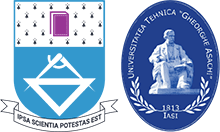Automation Engineer – Mathematical Modeler
Descriere job
Technical Skills
The mathematical modelers typically hold a PhD or a master’s degree or, in some cases, an experienced professional in mathematical process modeling may be acceptable. A mathematical modeler shall have also skills in software programming and computational algorithms, as well, as the mathematical equations have to be translated into a computational process application in order to be applied. Knowledge in the optimization science is also required, as some complex problems require complex optimization approach and solutions,
A mathematical modeler may hold a university degree of mathematics or physics or engineering.
Other required skills are:
– To be fluent in the English language in both writing and speaking.
Soft Skills
– To be proactive and team worker.
– To work hard at communication: up, down, laterally and to different audiences.
– To work at writing things down.
– To develop and to demonstrate the technical competence in the roles and in the responsibilities and not superficial work but deep competence.
– To do other activities that widen the personal network, internally in AMG and externally in other AM sites and institutions like universities and AM R&D.
– To seek to broaden the technical base and the process knowledge.
To deliver the commitments and to be an over deliver.
To be able to enter and to understand mathematical process models developed by others.
Job Characteristics
a. To work in the steel industry in the Automation Department at SImulation, MOdels and Progress (SIMOP) Team.
b. To work broadly for the Automation Department in the area of Mathematical Process Modeling Systems Engineering. The responsibilities are: to ensure the technical soundness of ongoing mathematical process models, as well as to be aware of and to insert the appropriate technology needed for future programs. Hence, a typical working day combines these two thrusts: working with ongoing programs, as well as outside companies, other AM sites, universities, and with the AM Research and Development team in order to understand, to apply and to maintain the technological landscape, regarding the mathematical process modeling for the company process and business improvement.
c. To enter in the existing mathematical process models in order to maintain, to improve and to boost them.
What does a Mathematical Modeler do?
In the context of an industrial environment, a mathematical modeler uses the knowledge of mathematical science to build mathematical models in order to represent, to simulate and to control an industrial process.
Also, a mathematical model can be used to illustrate a particular process and to solve complex problems like: metallurgical ones, logistics ones and financial or economical ones.
A mathematical modeler uses his/her mathematical modeling skills along with software technology in order to create and to build a process representation in a computer environment which will be applied for the process control or to solve complex problems. Moreover, a mathematical modeler shall be able to understand a mathematical process model developed by third parties in order to maintain it and to improve it.
Where are the roles of a Mathematical Modeler?
The modeler main role is to encode any process or any complex problem in mathematical equations and to translate them into a set of computational algorithms for its simulation and control. In the context of AMG, a modeler will work in developing and maintaining mathematical process models for the steel producing process and its correlated areas like: logistics and maintenance.

